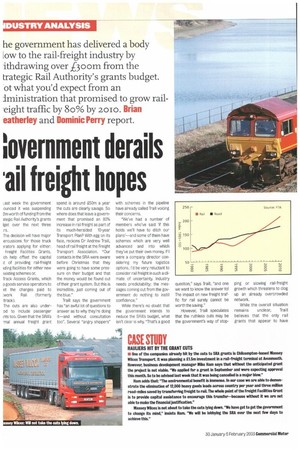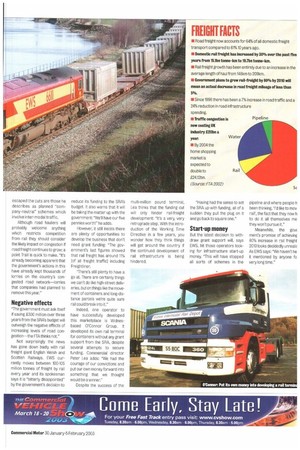lovernment derails 'ail freight hopes
Page 10

Page 11

If you've noticed an error in this article please click here to report it so we can fix it.
,ast week the government ounced it was suspending 2m worth of funding from the ategic Rail Authority's grants Iget over the next three rs.
The decision will have major ,ercussions for those truck wators applying for either: Freight Facilities Grants, ch help offset the capital ;t of providing rail-freight idling facilities for either new ?xisting schemes or,
Track Access Grants, which p goods service operators to et the changes paid to :work Rail (formerly track).
The cuts are also underod to include passenger ,rits too. Given that the SRA's -mal annual freight grant
spend is around .250m a year the cuts are clearly savage. So where does that leave a government that promised an 80% increase in rail freight as part of its much-heralded 10-year Transport Plan? With egg on its face, reckons Dr Andrew Traill, head of rail freight at the Freight Transport Association. "Our contacts in the SRA were aware before Christmas that they were going to have some pressure on their budget and that the money would be found out of their grant system. But this is incredible, just coming out of the blue."
Traill says the government has "an awful lot of questions to answer as to why they're doing it—and without consultation too". Several "angry shippers" with schemes in the pipeline have already called Traill voicing their concerns.
"We've had a number of members who've said 'if this holds we'll have to ditch our plans'—and some of them have schemes which are very well advanced and into which they've put their own money. If I were a company director considering my future logistics options, I'd be very reluctant to consider rail freight in such a climate of uncertainty. Industry needs predictability: the messages coming out from the government do nothing to instill confidence."
While there's no doubt that the government intends to reduce the SRA's budget, what isn't clear is why. "That's a good question," says Traill, "and one we want to know the answer to! The impact on new freight traffic for rail surely cannot be worth the saving."
However, Traill speculates that the ruthless cuts may be the government's way of stop
ping or slowing rail-freight growth which threatens to clog up an already overcrowded network.
While the overall situation remains unclear, Traill believes that the only rail grants that appear to have escaped the cuts are those he describes as planned 'company-neutral" schemes which involve inter-modal traffic.
Although road hauliers will probably welcome anything which restricts competition from rail they should consider the likely impact on congestion if road freight continues to grow: a point Traill is quick to make. "It's already becoming apparent that the government's actions in this have already kept thousands of lorries on the country's congested road network—lorries that companies had planned to remove this year."
Negative effects "The government must ask itself if saving £300 million over three years from the SRA's budget will outweigh the negative effects of increasing levels of road congestion—the FTA thinks not."
Not surprisingly the news has gone down badly with rail freight giant English Welsh and Scottish Railways. EWS currently moves between 100-105 million tonnes of freight by rail every year and its spokesman says it is "bitterly disappointed" by the government's decision to
reduce its funding to the SRA's budget. It also warns that it will be taking the matter up with the government: "We'll have our five pennies worth!" he adds.
However, it still insists there are plenty of opportunities to develop the business that don't need grant funding: "The government's last figures showed that rail freight has around 11% [of all freight traffic) including Freightliner.
"There's still plenty to have a go at. There are certainly things we can't do like high-street deliveries, but on things like the movement of containers and long-distance parcels we're quite sure rail could break into it."
Indeed, one operator to have successfully developed this marketplace is Widnesbased O'Connor Group. It developed its own rail terminal for containers without any grant support from the SRA, despite several attempts to secure funding. Commercial director Peter Lea adds: "We had the courage of our convictions and put our own money forward into something that we thought would be a winner."
Despite the success of the multi-million pound terminal, Lea thinks that the funding cut will only hinder rail-freight development: "It's a very, very retrograde step. With the introduction of the Working Time Directive in a few years, you wonder how they think things will get around the country if the continued development of rail infrastructure is being hindered. "Having had the sense to set the SRA up with funding, all of a sudden they pull the plug on it and go back to square one."
Start-up money But the latest decision to withdraw grant support will, says EWS, hit those operators looking for infrastructure start-up money. "This will have stopped all sorts of schemes in the pipeline and where people h been thinking, "I'd like to mov rail', the fact that they now h to do it all themselves me they won't pursue it."
Meanwhile, the goy( ment's promise of achieving 80% increase in rail freight 2010 looks decidedly unreak As EWS says: "We haven't he it mentioned by anyone to very long time."




























































































































































